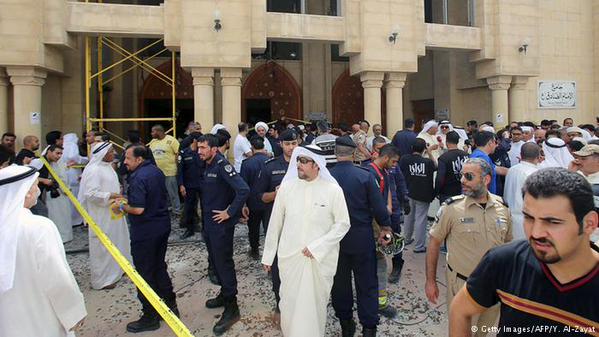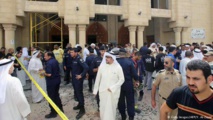The IS jihadists were also accused by the Syrian Observatory for Human Rights of killing 164 civilians in an offensive on the Kurdish town of Kobane.
The Islamist bloodshed comes on the second Friday of the holy month of Ramadan in which Muslims observe a fast from dawn to sunset every day.
On Tuesday, Islamic State group spokesman Abu Mohammed al-Adnani called for Muslims to engage in jihad and become martyrs during Ramadan.
"The best acts that bring you closer to God are jihad, so hurry to it and make sure to carry out the invasion this holy month and be exposed to martyrdom in it," Adnani said in an audio message posted online.
"These are your weapons and this is Ramadan."
- Grim start in Somalia, France -
The gory day began with a dawn raid on an African Union base in Somalia by Al-Qaeda affiliated Shebab militants who often increase attacks during Ramadan.
Witnesses said as many as 50 people were killed in Lego village, 100 kilometres (62 miles) northwest of the capital Mogadishu, and some of them beheaded, before Shebab hoisted a black Islamic flag over the base.
It was not possible to independently confirm the death toll.
In France, a few hours later, at least one extremist rammed a car into an American-owned industrial gas factory near France's second city of Lyon.
The severed head of a businessman identified as the employer of the suspect arrested by police, was found pinned to the gates of the Air Products factory.
French President Francois Hollande said inscriptions were found on the victim's body, while Interior Minister Bernard Cazeneuve said Islamist flags were displayed around the head.
"The intent was without doubt to cause an explosion. It was a terrorist attack," said Hollande.
Cazeneuve said the suspect was known for links to a radical form of Sunni Islam.
The act of beheading has become a hallmark of the Islamic State group which has taken over large parts of Iraq and Syria and rallied supporters around the world to carry out attacks on home soil.
It was not clear whether the flags -- different versions of which are used by several Islamist groups -- were those of IS.
- Massacres in Tunisia, Kuwait -
Shortly after the attack in France, a gunman entered a resort on the sun-soaked Tunisian coast with a weapon concealed in his beach umbrella, before opening fire and killing 37 people, including foreign tourists.
With the memories of earlier attacks still raw in both their countries, Hollande and his Tunisian counterpart Beji Caid Essebsi spoke after Friday's events and voiced "solidarity in the face of terrorism".
In January, 17 people were killed in Islamist attacks around Paris and in March, 21 tourists were killed in an attack on a Tunis museum.
Then just after noon in Kuwait as Muslims took part in Friday prayers, a suicide bomber entered a mosque, detonating and killing 28 people in the Gulf state's first such attack in nearly a decade.
The IS-affiliated group in Saudi Arabia, calling itself Najd Province, said one of its militants was behind the bombing on a mosque it claimed was spreading Shiite teachings among Sunni Muslims.
IS, a radical Sunni Muslim group, considers Shiites to be heretics. Najd Province has claimed responsibility for several other attacks on Shiite mosques in neighbouring Saudi Arabia.
- 'Perverted ideology' -
The Islamic State group marks June 29 as the first anniversary of its self-declared "caliphate" straddling Iraq and Syria.
On Friday, its fighters attacked the Syrian town of Kobane from which it was dramatically ousted in January by Kurdish militia backed by US-led air strikes after four months of heavy fighting.
The Syrian Observatory for Human Rights said at least 120 civilians were killed in a 24-hour rampage on Kobane, and another 26 were executed in a nearby village.
The bullet-riddled bodies of 18 people -- including children -- were found Friday in the streets of Kobane, the British-based Observatory said.
France and Spain raised their alert level after the attacks, while several European leaders held emergency government meetings. US President Barack Obama was briefed on the bloodshed in Tunisia, Kuwait and France, Washington said.
The White House later condemned what it described as "heinous attacks" in the three countries, adding: "We stand with these nations as they respond to attacks on their soil today."
German Chancellor Angela Merkel said the attacks "show the challenges we face when it comes to fighting terrorism and Islamist extremism".
"Our hearts all go out to the victims of these appalling terrorist attacks," Britain's Prime Minister David Cameron said, branding them the fruit of "perverted ideology"
------------------------------------------------------------------------------------------------------------------
The Islamist bloodshed comes on the second Friday of the holy month of Ramadan in which Muslims observe a fast from dawn to sunset every day.
On Tuesday, Islamic State group spokesman Abu Mohammed al-Adnani called for Muslims to engage in jihad and become martyrs during Ramadan.
"The best acts that bring you closer to God are jihad, so hurry to it and make sure to carry out the invasion this holy month and be exposed to martyrdom in it," Adnani said in an audio message posted online.
"These are your weapons and this is Ramadan."
- Grim start in Somalia, France -
The gory day began with a dawn raid on an African Union base in Somalia by Al-Qaeda affiliated Shebab militants who often increase attacks during Ramadan.
Witnesses said as many as 50 people were killed in Lego village, 100 kilometres (62 miles) northwest of the capital Mogadishu, and some of them beheaded, before Shebab hoisted a black Islamic flag over the base.
It was not possible to independently confirm the death toll.
In France, a few hours later, at least one extremist rammed a car into an American-owned industrial gas factory near France's second city of Lyon.
The severed head of a businessman identified as the employer of the suspect arrested by police, was found pinned to the gates of the Air Products factory.
French President Francois Hollande said inscriptions were found on the victim's body, while Interior Minister Bernard Cazeneuve said Islamist flags were displayed around the head.
"The intent was without doubt to cause an explosion. It was a terrorist attack," said Hollande.
Cazeneuve said the suspect was known for links to a radical form of Sunni Islam.
The act of beheading has become a hallmark of the Islamic State group which has taken over large parts of Iraq and Syria and rallied supporters around the world to carry out attacks on home soil.
It was not clear whether the flags -- different versions of which are used by several Islamist groups -- were those of IS.
- Massacres in Tunisia, Kuwait -
Shortly after the attack in France, a gunman entered a resort on the sun-soaked Tunisian coast with a weapon concealed in his beach umbrella, before opening fire and killing 37 people, including foreign tourists.
With the memories of earlier attacks still raw in both their countries, Hollande and his Tunisian counterpart Beji Caid Essebsi spoke after Friday's events and voiced "solidarity in the face of terrorism".
In January, 17 people were killed in Islamist attacks around Paris and in March, 21 tourists were killed in an attack on a Tunis museum.
Then just after noon in Kuwait as Muslims took part in Friday prayers, a suicide bomber entered a mosque, detonating and killing 28 people in the Gulf state's first such attack in nearly a decade.
The IS-affiliated group in Saudi Arabia, calling itself Najd Province, said one of its militants was behind the bombing on a mosque it claimed was spreading Shiite teachings among Sunni Muslims.
IS, a radical Sunni Muslim group, considers Shiites to be heretics. Najd Province has claimed responsibility for several other attacks on Shiite mosques in neighbouring Saudi Arabia.
- 'Perverted ideology' -
The Islamic State group marks June 29 as the first anniversary of its self-declared "caliphate" straddling Iraq and Syria.
On Friday, its fighters attacked the Syrian town of Kobane from which it was dramatically ousted in January by Kurdish militia backed by US-led air strikes after four months of heavy fighting.
The Syrian Observatory for Human Rights said at least 120 civilians were killed in a 24-hour rampage on Kobane, and another 26 were executed in a nearby village.
The bullet-riddled bodies of 18 people -- including children -- were found Friday in the streets of Kobane, the British-based Observatory said.
France and Spain raised their alert level after the attacks, while several European leaders held emergency government meetings. US President Barack Obama was briefed on the bloodshed in Tunisia, Kuwait and France, Washington said.
The White House later condemned what it described as "heinous attacks" in the three countries, adding: "We stand with these nations as they respond to attacks on their soil today."
German Chancellor Angela Merkel said the attacks "show the challenges we face when it comes to fighting terrorism and Islamist extremism".
"Our hearts all go out to the victims of these appalling terrorist attacks," Britain's Prime Minister David Cameron said, branding them the fruit of "perverted ideology"
------------------------------------------------------------------------------------------------------------------









 Home
Home Politics
Politics











